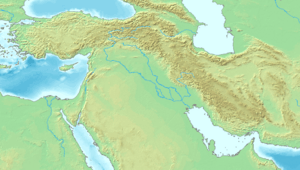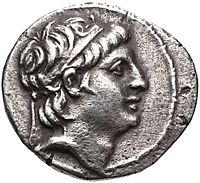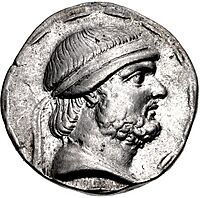Battle of Ecbatana facts for kids
Quick facts for kids Battle of Ecbatana |
|||||||||
|---|---|---|---|---|---|---|---|---|---|
| Part of Seleucid–Parthian Wars | |||||||||
|
|||||||||
| Belligerents | |||||||||
| Parthians | Seleucids and allies | ||||||||
| Commanders and leaders | |||||||||
| Phraates II | Antiochus VII Sidetes † | ||||||||
| Strength | |||||||||
| up to 10,000 men | up to 4,300 men | ||||||||
| Casualties and losses | |||||||||
| up to 700 | Mostly killed or captured | ||||||||
The Battle of Ecbatana was a major fight in 129 BC. It happened between the Seleucids, led by King Antiochus VII Sidetes, and the Parthians, led by King Phraates II. This battle was the Seleucids' last big try to get back their power in the eastern lands. After this defeat, the Seleucid Empire became much smaller, only controlling the area around Syria.
The Battle of Ecbatana
How the Battle Unfolded
King Phraates II of Parthia faced a final challenge from the Seleucids. The Seleucids wanted to take back their lands in the east. They gathered a huge army of about 80,000 soldiers, including many hired Greek fighters (mercenaries). In 130 BC, they started a campaign to retake Mesopotamia.
The Parthian general Indates was defeated near the Great Zab river. Then, people in the area rebelled, and the Parthian governor of Babylonia was killed. Antiochus took control of Babylonia and also captured Susa, where he even started making his own coins. He then moved his army into a region called Media.
After losing three battles in a row, King Phraates sent people to talk about peace. Antiochus had tough demands. He said the Parthians had to give back all the lands they had taken, except for Parthia itself. He also demanded a lot of money and wanted his brother, Demetrius II, to be set free.
Phraates did release Demetrius and sent him back to Syria. However, he refused the other demands. Antiochus then sent his large army to different cities for the winter.
By the spring of 129 BC, the people of Media were openly fighting against Antiochus. His army had used up all the food and supplies in the countryside during the winter. Many cities rebelled against the Seleucid soldiers being there. Antiochus marched with only a small group, probably his personal guards, to help a small group of his soldiers who were stuck.
King Phraates used this chance to surprise attack Antiochus. The Parthians badly defeated the Seleucid forces at the Battle of Ecbatana (which is modern Hamadan). During the battle, King Antiochus VII was killed, and his personal guards were all wiped out. His body was sent back to Syria in a silver coffin. His son, Seleucus, was taken as a prisoner by the Parthians, and one of his daughters joined Phraates' royal family.
After the Battle of Ecbatana, most of the remaining Seleucid army in Media was destroyed. The soldiers who were captured were made to join the Parthian army. This battle was a huge and final defeat for the Seleucid Empire against the Parthians. It also marked the end of the Hellenistic period (a time when Greek culture was very strong) in Iran.
Who Fought in the Battle?
The main leaders in the Battle of Ecbatana were King Antiochus VII Sidetes for the Seleucids and King Phraates II for the Parthians.
-
A coin showing Antiochos VII
 | William Lucy |
 | Charles Hayes |
 | Cleveland Robinson |




